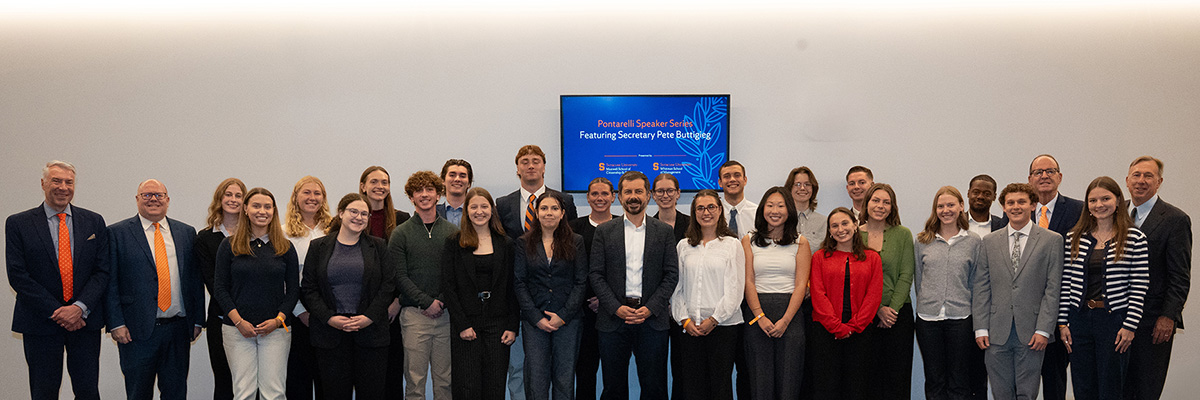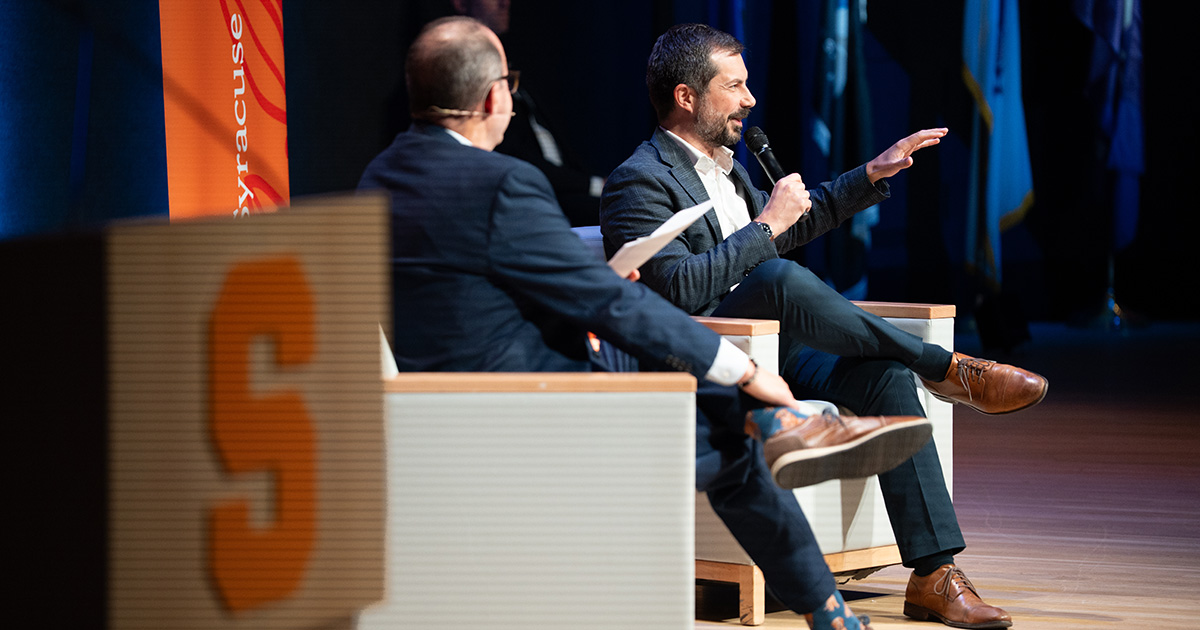The Syracuse event occurred three days into a shutdown of the U.S. government with Democrats and Republicans in a spending stalemate. Golden’s first question presented an opportunity for a general assessment: “Where are we today as a nation?”
“I don’t think it’s an exaggeration to say that not since the Civil War has our country faced this level of challenges—certainly not since World War II,” replied Buttigieg. “And so much of it is actually happening not because of an external threat. The things that are happening are within us, within the American people—even within us as individuals.”
Early on, Buttigieg asked those in the audience under age 25 to raise their hands, prompting a majority of arms to go up. When he posed a follow-up question—how many of them get their news from watching television on a television—only a few remained raised.
Social media, with its misinformation and algorithms, has distorted perspectives and relationships, he said. At the same time, Buttigieg said, the U.S. is witnessing an unprecedented level of government assertion of control over not only its own branches but also entities that have long remained independent such as academia and even late-night television.
“That makes this an extremely challenging time, but also a particularly important time for universities, because universities exist for the purpose of finding the truth, for the purpose of fostering dialogue and healthy difference and for charting where we are supposed to go next in ways that maybe won’t fully resemble the status quo that we inherited,” said Buttigieg, who later said universities need to fiercely guard their independence.
Several of Golden’s questions focused on the environment. For instance, he wondered what the current administration is trying to accomplish by repealing and diminishing protections. Buttigieg shared his view that much of the transitions have served to benefit certain friends and allies.
“Part of the tragedy of this is there is a healthy conservative critique to be made of environmental policies that are either self-defeating or unreasonable,” added Buttigieg. “And I say that as a strong believer in environmental protection.”
He shared how, upon taking office in South Bend, he was challenged by a mandate from the Environmental Protection Agency to overhaul the sewer system, a measure that would have cost $1 billion and roughly $10,000 for every individual in the city. He also shared frustration in navigating the federal response to the flooding; relief funding was intended for restoration, not redesigning to mitigate damage from future acts of nature that seemed likely due to climate change.
Several students involved with the DSL posed questions during the event, some related to climate change and the recent downsizing of federal departments.
Emily Wilson, who is pursuing a master of science in sustainable organizations and policy (MSOP) degree through a joint program between Maxwell and Whitman, asked, “What should be the role of the federal government and private businesses like insurance companies to help protect and support communities to be more resilient from climate change?”
Buttigieg said it’s a “huge responsibility” and noted that billions were spent by the Biden administration on infrastructure improvements. “And the reason was, we realized that not only did we have a proactive responsibility to make our infrastructure more resilient, but we also needed to make sure we weren’t part of the problem,” he said.
Another MSOP student, Donough Lawlor, asked Buttigieg to comment on the impacts of doing away with USAID and the worldview of U.S. leadership.
He shared that earlier in the week he’d been in London engaging with leaders from countries that have long been U.S. allies and who “are well past the point of just being irritated or upset or disappointed in the U.S.” “They are actively working to reorganize their whole security and foreign relations architecture for a world where the U.S. cannot be counted on to do the right thing,” he said.
While he expressed deep concern for the dismantling of USAID and other government programs and departments, Buttigieg pointed out that many were formed in the 1940s and 50s “based on the way the world was.” He said he feels an obligation to be hopeful for the future and urged the audience to consider the opportunities presented.
“Sooner or later, it’s going to be somebody’s job to figure out what to put in there next,” he said. “And that’s actually a huge opportunity to set up development aid in a way that is more responsive to the needs of the people it’s supposed to serve.”
He added, “my main impulse is not despondency, even though it can be depressing to watch, but actually propulsion. This should be propulsive, especially for a generation of people coming of age at this moment. This should be propulsion to figure out not just how do we stop the damage, but what would we do if there were a clean sheet?”
 Students from across the University who are involved with the Maxwell-based Dynamic Sustainability Lab (DSL) joined Pete Buttigieg, Maxwell and Whitman deans and event sponsor Ken Pontarelli for a luncheon and conversation during his visit on Oct. 3.
Students from across the University who are involved with the Maxwell-based Dynamic Sustainability Lab (DSL) joined Pete Buttigieg, Maxwell and Whitman deans and event sponsor Ken Pontarelli for a luncheon and conversation during his visit on Oct. 3.
Having a transformative vision—one that doesn’t seek to return to the way things used to be—was a theme throughout Buttigieg’s talk. In South Bend, he said, prior generations often reflected about the economic boomtime prior to the 1963 closure of a main employer, the Studebaker auto plant.
His community had a breakthrough in part, he said, because his generation was the first that didn’t experience its automaking heyday. “If I had lived to see what it was like when the streets that I knew as empty had been heaving with activity, if I knew what it was actually like now by using not my imagination, but my memory, when the little houses on the west side of South Bend were thriving, healthy, upwardly mobile, middle class neighborhoods, and then we’d lost it, in my lifetime, I bet I would have been unable to think of anything.”
But as mayor, he said, all he could consider is “what do we do next?”
Similarly, as the use of artificial intelligence continues to grow, transforming and in some cases eliminating long-held livelihoods, Buttigieg said it will be important to closely examine policy and seek ways to foster a sense of community among displaced workers. “So, we don’t just have to think about the tech itself and making sure it’s safe,” he said. “We have to think about how to make sure that people can get through that upheaval and where is your belonging supposed to come from?”
Buttigieg also focused on the importance of talking to people and seeking connections in unexpected places. He recalled criticism for his appearance on Fox News during his 2020 presidential campaign, and shared how he recently joined a golf podcast, despite knowing little about the sport.
“How can we blame people for rejecting our worldview if they’ve literally never heard it?” he asked. “We have to go where people already are, even if they don’t agree with us.”
A parting message was focused on those in the audience who’d raised their hands.
“If you’re considering participating in civic processes, which I hope you will, don’t underestimate the moral authority that you carry as a young person saying, ‘This decision you’re about to make affects me,’” he said. “That can have an enormous influence in everything from a council chamber to a federal rulemaking process. …The longer you are planning to be here, the more you have at stake, and I think, the more you have to say.”
By Jessica Youngman

